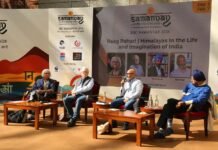
At the Jaipur BookMark professional publishing event held in January this year alongside the Jaipur Literature Festival (JLF) we again witnessed the routine quotation of anecdotal data and wrong information gathered from the internet about the Indian book industry. “The same or similar wrong data repeated endlessly by publishers such as O’Reilly, book printers such as Repro India on their web sites and many others although well meaning, has created a consensus of nonsense,” says Naresh Khanna, editor of this magazine and an industry researcher over the past decade and a half, who set up Ipp Services, Training and Research PL in 2001.
Khanna goes on to question the attitude of the industry to really finding out the facts, “There is a total lack of interest by the huge Indian publishing industry in establishing the facts and collecting the necessary data which could be used to understand where the industry is and where it needs to go. Primary research is needed and there is no way that a serious project can avoid a large number of interviews of authors, publishers, publishing professionals, distributors and book sellers around the country.”
Khanna’s proposition which he bases on IppStar’s knowledge and research of Indian print and paper consumption, is that, “The book industry is actually far larger than anyone dares to establish or talk
about. We are interested in collected primary data and building a proper model of the entire industry and validating the numbers with plausibility checks, discussions and meetings with the large number of expert informants in the industry. All this data needs to be collected, validated and put on the same page. From this work will come some kind of analysis and trend forecasting.”
IppStar began addressing formulating a book publishing industry project in December 2013. Beginning with a discussion with publishers and academics also interested in a more scientific understanding of this industry, it developed six questionnaires that were tried out by its researchers at both the JLF and at the World Book Fair (WBF) in Delhi earlier this year.
Although the IppStar survey plans to interview a large stratified sample of respondents by travelling to 14 cities in the country, the preliminary interviews at Jaipur and Delhi already indicate that even most large professionally managed publishers have little idea of the industry or its growth trends. Nevertheless the qualitative aspect of these preliminary interviews do reveal some of the interesting practices and expectations of readers, authors, publishers, distributors and book sellers who attend literary festivals and book fairs.
For instance, there is a high awareness of ePublishing and eBooks but it is unclear whether readers are
ready to pay for these and whether they are likely to use tablets or even smart phones to read books. The question of text books is even more confusing since many college students already read many text and reference books that are freely available as PDFs on their laptops. However, more than 40% of the student respondents surveyed at Jaipur and Delhi say that they would prefer using eBooks if increased content was available to them.
Most of the respondents surveyed at JLF and Delhi WBF 2014 prefer reading printed books although they expect an inevitable shift to reading eBooks. They expect that the shift will first be mostly to reading books on laptops but also on tablets and to a smaller extent on smartphones. At the JLF 60% of the respondents owned smartphones while 73% of those surveyed at the Delhi WBF owned smartphones. Amongst surveyed visitors at both the literary and publishing events, tablet ownership of the respondents is above 33%. For the same respondents laptop ownership is above 60%.
The IppStar Book Publishing in India Research Project is still being developed as an independent project. However, IppStar is actively seeking support of both institutions and publishers who want to support what is envisaged as a multi-client study. For more information please go to www.ippstar.org or contact Purva
Dwivedi at research@ipproup.in.

















